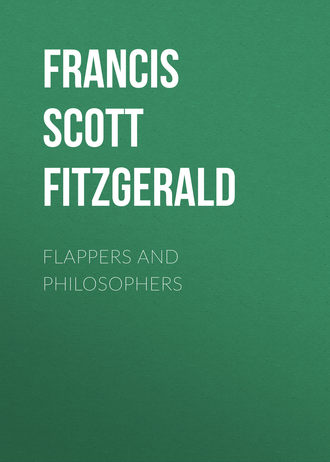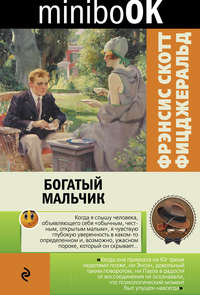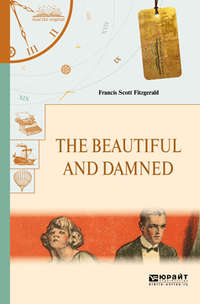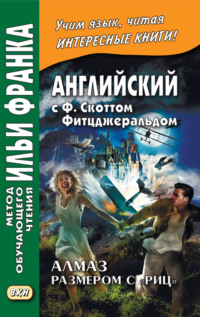 полная версия
полная версияFlappers and Philosophers
"Let's dance," cried Ardita. "I can't sit still with that perfect jazz going on."
Taking her hand he led her out into a broad stretch of hard sandy soil that the moon flooded with great splendor. They floated out like drifting moths under the rich hazy light, and as the fantastic symphony wept and exulted and wavered and despaired Ardita's last sense of reality dropped away, and she abandoned her imagination to the dreamy summer scents of tropical flowers and the infinite starry spaces overhead, feeling that if she opened her eyes it would be to find herself dancing with a ghost in a land created by her own fancy.
"This is what I should call an exclusive private dance," he whispered.
"I feel quite mad – but delightfully mad!"
"We're enchanted. The shades of unnumbered generations of cannibals are watching us from high up on the side of the cliff there."
"And I'll bet the cannibal women are saying that we dance too close, and that it was immodest of me to come without my nose-ring."
They both laughed softly – and then their laughter died as over across the lake they heard the trombones stop in the middle of a bar, and the saxaphones give a startled moan and fade out.
"What's the matter?" called Carlyle.
After a moment's silence they made out the dark figure of a man rounding the silver lake at a run. As he came closer they saw it was Babe in a state of unusual excitement. He drew up before them and gasped out his news in a breath.
"Ship stan'in' off sho' 'bout half a mile suh. Mose, he uz on watch, he say look's if she's done ancho'd."
"A ship – what kind of a ship?" demanded Carlyle anxiously.
Dismay was in his voice, and Ardita's heart gave a sudden wrench as she saw his whole face suddenly droop.
"He say he don't know, suh."
"Are they landing a boat?"
"No, suh."
"We'll go up," said Carlyle.
They ascended the hill in silence, Ardita's hand still resting in Carlyle's as it had when they finished dancing. She felt it clinch nervously from time to time as though he were unaware of the contact, but though he hurt her she made no attempt to remove it. It seemed an hour's climb before they reached the top and crept cautiously across the silhouetted plateau to the edge of the cliff. After one short look Carlyle involuntarily gave a little cry. It was a revenue boat with six-inch guns mounted fore and aft.
"They know!" he said with a short intake of breath. "They know! They picked up the trail somewhere."
"Are you sure they know about the channel? They may be only standing by to take a look at the island in the morning. From where they are they couldn't see the opening in the cliff."
"They could with field-glasses," he said hopelessly. He looked at his wrist-watch. "It's nearly two now. They won't do anything until dawn, that's certain. Of course there's always the faint possibility that they're waiting for some other ship to join; or for a coaler."
"I suppose we may as well stay right here."
The hour passed and they lay there side by side, very silently, their chins in their hands like dreaming children. In back of them squatted the negroes, patient, resigned, acquiescent, announcing now and then with sonorous snores that not even the presence of danger could subdue their unconquerable African craving for sleep.
Just before five o'clock Babe approached Carlyle. There were half a dozen rifles aboard the Narcissus he said. Had it been decided to offer no resistance?
A pretty good fight might be made, he thought, if they worked out some plan.
Carlyle laughed and shook his head.
"That isn't a Spic army out there, Babe. That's a revenue boat. It'd be like a bow and arrow trying to fight a machine-gun. If you want to bury those bags somewhere and take a chance on recovering them later, go on and do it. But it won't work – they'd dig this island over from one end to the other. It's a lost battle all round, Babe."
Babe inclined his head silently and turned away, and Carlyle's voice was husky as he turned to Ardita.
"There's the best friend I ever had. He'd die for me, and be proud to, if I'd let him."
"You've given up?"
"I've no choice. Of course there's always one way out – the sure way – but that can wait. I wouldn't miss my trial for anything – it'll be an interesting experiment in notoriety. 'Miss Farnam testifies that the pirate's attitude to her was at all times that of a gentleman.'"
"Don't!" she said. "I'm awfully sorry."
When the color faded from the sky and lustreless blue changed to leaden gray a commotion was visible on the ship's deck, and they made out a group of officers clad in white duck, gathered near the rail. They had field-glasses in their hands and were attentively examining the islet.
"It's all up," said Carlyle grimly.
"Damn," whispered Ardita. She felt tears gathering in her eyes "We'll go back to the yacht," he said. "I prefer that to being hunted out up here like a 'possum."
Leaving the plateau they descended the hill, and reaching the lake were rowed out to the yacht by the silent negroes. Then, pale and weary, they sank into the settees and waited.
Half an hour later in the dim gray light the nose of the revenue boat appeared in the channel and stopped, evidently fearing that the bay might be too shallow. From the peaceful look of the yacht, the man and the girl in the settees, and the negroes lounging curiously against the rail, they evidently judged that there would be no resistance, for two boats were lowered casually over the side, one containing an officer and six bluejackets, and the other, four rowers and in the stern two gray-haired men in yachting flannels. Ardita and Carlyle stood up, and half unconsciously started toward each other.
Then he paused and putting his hand suddenly into his pocket he pulled out a round, glittering object and held it out to her.
"What is it?" she asked wonderingly.
"I'm not positive, but I think from the Russian inscription inside that it's your promised bracelet."
"Where – where on earth – "
"It came out of one of those bags. You see, Curtis Carlyle and his Six Black Buddies, in the middle of their performance in the tea-room of the hotel at Palm Beach, suddenly changed their instruments for automatics and held up the crowd. I took this bracelet from a pretty, overrouged woman with red hair."
Ardita frowned and then smiled.
"So that's what you did! You have got nerve!"
He bowed.
"A well-known bourgeois quality," he said.
And then dawn slanted dynamically across the deck and flung the shadows reeling into gray corners. The dew rose and turned to golden mist, thin as a dream, enveloping them until they seemed gossamer relics of the late night, infinitely transient and already fading. For a moment sea and sky were breathless, and dawn held a pink hand over the young mouth of life – then from out in the lake came the complaint of a rowboat and the swish of oars.
Suddenly against the golden furnace low in the east their two graceful figures melted into one, and he was kissing her spoiled young mouth.
"It's a sort of glory," he murmured after a second.
She smiled up at him.
"Happy, are you?"
Her sigh was a benediction – an ecstatic surety that she was youth and beauty now as much as she would ever know. For another instant life was radiant and time a phantom and their strength eternal – then there was a bumping, scraping sound as the rowboat scraped alongside.
Up the ladder scrambled the two gray-haired men, the officer and two of the sailors with their hands on their revolvers. Mr. Farnam folded his arms and stood looking at his niece.
"So," he said nodding his head slowly.
With a sigh her arms unwound from Carlyle's neck, and her eyes, transfigured and far away, fell upon the boarding party. Her uncle saw her upper lip slowly swell into that arrogant pout he knew so well.
"So," he repeated savagely. "So this is your idea of – of romance. A runaway affair, with a high-seas pirate."
Ardita glanced at him carelessly.
"What an old fool you are!" she said quietly.
"Is that the best you can say for yourself?"
"No," she said as if considering. "No, there's something else. There's that well-known phrase with which I have ended most of our conversations for the past few years – 'Shut up!'"
And with that she turned, included the two old men, the officer, and the two sailors in a curt glance of contempt, and walked proudly down the companionway.
But had she waited an instant longer she would have heard a sound from her uncle quite unfamiliar in most of their interviews. He gave vent to a whole-hearted amused chuckle, in which the second old man joined.
The latter turned briskly to Carlyle, who had been regarding this scene with an air of cryptic amusement.
"Well Toby," he said genially, "you incurable, hare-brained romantic chaser of rainbows, did you find that she was the person you wanted?"
Carlyle smiled confidently.
"Why – naturally," he said "I've been perfectly sure ever since I first heard tell of her wild career. That'd why I had Babe send up the rocket last night."
"I'm glad you did," said Colonel Moreland gravely. "We've been keeping pretty close to you in case you should have trouble with those six strange niggers. And we hoped we'd find you two in some such compromising position," he sighed. "Well, set a crank to catch a crank!"
"Your father and I sat up all night hoping for the best – or perhaps it's the worst. Lord knows you're welcome to her, my boy. She's run me crazy. Did you give her the Russian bracelet my detective got from that Mimi woman?"
Carlyle nodded.
"Sh!" he said. "She's coming on deck."
Ardita appeared at the head of the companionway and gave a quick involuntary glance at Carlyle's wrists. A puzzled look passed across her face. Back aft the negroes had begun to sing, and the cool lake, fresh with dawn, echoed serenely to their low voices.
"Ardita," said Carlyle unsteadily.
She swayed a step toward him.
"Ardita," he repeated breathlessly, "I've got to tell you the – the truth. It was all a plant, Ardita. My name isn't Carlyle. It's Moreland, Toby Moreland. The story was invented, Ardita, invented out of thin Florida air."
She stared at him, bewildered, amazement, disbelief, and anger flowing in quick waves across her face. The three men held their breaths. Moreland, Senior, took a step toward her; Mr. Farnam's mouth dropped a little open as he waited, panic-stricken, for the expected crash.
But it did not come. Ardita's face became suddenly radiant, and with a little laugh she went swiftly to young Moreland and looked up at him without a trace of wrath in her gray eyes.
"Will you swear," she said quietly "That it was entirely a product of your own brain?"
"I swear," said young Moreland eagerly.
She drew his head down and kissed him gently.
"What an imagination!" she said softly and almost enviously. "I want you to lie to me just as sweetly as you know how for the rest of my life."
The negroes' voices floated drowsily back, mingled in an air that she had heard them singing before.
"Time is a thief;Gladness and griefCling to the leafAs it yellows – ""What was in the bags?" she asked softly.
"Florida mud," he answered. "That was one of the two true things I told you."
"Perhaps I can guess the other one," she said; and reaching up on her tiptoes she kissed him softly in the illustration.
The Ice Palace
IThe sunlight dripped over the house like golden paint over an art jar, and the freckling shadows here and there only intensified the rigor of the bath of light. The Butterworth and Larkin houses flanking were entrenched behind great stodgy trees; only the Happer house took the full sun, and all day long faced the dusty road-street with a tolerant kindly patience. This was the city of Tarleton in southernmost Georgia, September afternoon.
Up in her bedroom window Sally Carrol Happer rested her nineteen-year-old chin on a fifty-two-year-old sill and watched Clark Darrow's ancient Ford turn the corner. The car was hot – being partly metallic it retained all the heat it absorbed or evolved – and Clark Darrow sitting bolt upright at the wheel wore a pained, strained expression as though he considered himself a spare part, and rather likely to break. He laboriously crossed two dust ruts, the wheels squeaking indignantly at the encounter, and then with a terrifying expression he gave the steering-gear a final wrench and deposited self and car approximately in front of the Happer steps. There was a heaving sound, a death-rattle, followed by a short silence; and then the air was rent by a startling whistle.
Sally Carrol gazed down sleepily. She started to yawn, but finding this quite impossible unless she raised her chin from the window-sill, changed her mind and continued silently to regard the car, whose owner sat brilliantly if perfunctorily at attention as he waited for an answer to his signal. After a moment the whistle once more split the dusty air.
"Good mawnin'."
With difficulty Clark twisted his tall body round and bent a distorted glance on the window.
"Tain't mawnin', Sally Carrol."
"Isn't it, sure enough?"
"What you doin'?"
"Eatin' 'n apple."
"Come on go swimmin' – want to?"
"Reckon so."
"How 'bout hurryin' up?"
"Sure enough."
Sally Carrol sighed voluminously and raised herself with profound inertia from the floor where she had been occupied in alternately destroyed parts of a green apple and painting paper dolls for her younger sister. She approached a mirror, regarded her expression with a pleased and pleasant languor, dabbed two spots of rouge on her lips and a grain of powder on her nose, and covered her bobbed corn-colored hair with a rose-littered sunbonnet. Then she kicked over the painting water, said, "Oh, damn!" – but let it lay – and left the room.
"How you, Clark?" she inquired a minute later as she slipped nimbly over the side of the car.
"Mighty fine, Sally Carrol."
"Where we go swimmin'?"
"Out to Walley's Pool. Told Marylyn we'd call by an' get her an' Joe Ewing."
Clark was dark and lean, and when on foot was rather inclined to stoop. His eyes were ominous and his expression somewhat petulant except when startlingly illuminated by one of his frequent smiles. Clark had "a income" – just enough to keep himself in ease and his car in gasolene – and he had spent the two years since he graduated from Georgia Tech in dozing round the lazy streets of his home town, discussing how he could best invest his capital for an immediate fortune.
Hanging round he found not at all difficult; a crowd of little girls had grown up beautifully, the amazing Sally Carrol foremost among them; and they enjoyed being swum with and danced with and made love to in the flower-filled summery evenings – and they all liked Clark immensely. When feminine company palled there were half a dozen other youths who were always just about to do something, and meanwhile were quite willing to join him in a few holes of golf, or a game of billiards, or the consumption of a quart of "hard yella licker." Every once in a while one of these contemporaries made a farewell round of calls before going up to New York or Philadelphia or Pittsburgh to go into business, but mostly they just stayed round in this languid paradise of dreamy skies and firefly evenings and noisy nigger street fairs – and especially of gracious, soft-voiced girls, who were brought up on memories instead of money.
The Ford having been excited into a sort of restless resentful life Clark and Sally Carrol rolled and rattled down Valley Avenue into Jefferson Street, where the dust road became a pavement; along opiate Millicent Place, where there were half a dozen prosperous, substantial mansions; and on into the down-town section. Driving was perilous here, for it was shopping time; the population idled casually across the streets and a drove of low-moaning oxen were being urged along in front of a placid street-car; even the shops seemed only yawning their doors and blinking their windows in the sunshine before retiring into a state of utter and finite coma.
"Sally Carrol," said Clark suddenly, "it a fact that you're engaged?"
She looked at him quickly.
"Where'd you hear that?"
"Sure enough, you engaged?"
"'At's a nice question!"
"Girl told me you were engaged to a Yankee you met up in Asheville last summer."
Sally Carrol sighed.
"Never saw such an old town for rumors."
"Don't marry a Yankee, Sally Carrol. We need you round here."
Sally Carrol was silent a moment.
"Clark," she demanded suddenly, "who on earth shall I marry?"
"I offer my services."
"Honey, you couldn't support a wife," she answered cheerfully. "Anyway, I know you too well to fall in love with you."
"'At doesn't mean you ought to marry a Yankee," he persisted.
"S'pose I love him?"
He shook his head.
"You couldn't. He'd be a lot different from us, every way."
He broke off as he halted the car in front of a rambling, dilapidated house. Marylyn Wade and Joe Ewing appeared in the doorway.
"'Lo Sally Carrol."
"Hi!"
"How you-all?"
"Sally Carrol," demanded Marylyn as they started of again, "you engaged?"
"Lawdy, where'd all this start? Can't I look at a man 'thout everybody in town engagin' me to him?"
Clark stared straight in front of him at a bolt on the clattering wind-shield.
"Sally Carrol," he said with a curious intensity, "don't you 'like us?"
"What?"
"Us down here?"
"Why, Clark, you know I do. I adore all you boys."
"Then why you gettin' engaged to a Yankee?"
"Clark, I don't know. I'm not sure what I'll do, but – well, I want to go places and see people. I want my mind to grow. I want to live where things happen on a big scale."
"What you mean?"
"Oh, Clark, I love you, and I love Joe here and Ben Arrot, and you-all, but you'll – you'll – "
"We'll all be failures?"
"Yes. I don't mean only money failures, but just sort of – of ineffectual and sad, and – oh, how can I tell you?"
"You mean because we stay here in Tarleton?"
"Yes, Clark; and because you like it and never want to change things or think or go ahead."
He nodded and she reached over and pressed his hand.
"Clark," she said softly, "I wouldn't change you for the world. You're sweet the way you are. The things that'll make you fail I'll love always – the living in the past, the lazy days and nights you have, and all your carelessness and generosity."
"But you're goin' away?"
"Yes – because I couldn't ever marry you. You've a place in my heart no one else ever could have, but tied down here I'd get restless. I'd feel I was – wastin' myself. There's two sides to me, you see. There's the sleepy old side you love an' there's a sort of energy – the feeling that makes me do wild things. That's the part of me that may be useful somewhere, that'll last when I'm not beautiful any more."
She broke of with characteristic suddenness and sighed, "Oh, sweet cooky!" as her mood changed.
Half closing her eyes and tipping back her head till it rested on the seat-back she let the savory breeze fan her eyes and ripple the fluffy curls of her bobbed hair. They were in the country now, hurrying between tangled growths of bright-green coppice and grass and tall trees that sent sprays of foliage to hang a cool welcome over the road. Here and there they passed a battered negro cabin, its oldest white-haired inhabitant smoking a corncob pipe beside the door, and half a dozen scantily clothed pickaninnies parading tattered dolls on the wild-grown grass in front. Farther out were lazy cotton-fields where even the workers seemed intangible shadows lent by the sun to the earth, not for toil, but to while away some age-old tradition in the golden September fields. And round the drowsy picturesqueness, over the trees and shacks and muddy rivers, flowed the heat, never hostile, only comforting, like a great warm nourishing bosom for the infant earth.
"Sally Carrol, we're here!"
"Poor chile's soun' asleep."
"Honey, you dead at last outa sheer laziness?"
"Water, Sally Carrol! Cool water waitin' for you!"
Her eyes opened sleepily.
"Hi!" she murmured, smiling.
IIIn November Harry Bellamy, tall, broad, and brisk, came down from his Northern city to spend four days. His intention was to settle a matter that had been hanging fire since he and Sally Carrol had met in Asheville, North Carolina, in midsummer. The settlement took only a quiet afternoon and an evening in front of a glowing open fire, for Harry Bellamy had everything she wanted; and, beside, she loved him – loved him with that side of her she kept especially for loving. Sally Carrol had several rather clearly defined sides.
On his last afternoon they walked, and she found their steps tending half-unconsciously toward one of her favorite haunts, the cemetery. When it came in sight, gray-white and golden-green under the cheerful late sun, she paused, irresolute, by the iron gate.
"Are you mournful by nature, Harry?" she asked with a faint smile.
"Mournful? Not I."
"Then let's go in here. It depresses some folks, but I like it."
They passed through the gateway and followed a path that led through a wavy valley of graves – dusty-gray and mouldy for the fifties; quaintly carved with flowers and jars for the seventies; ornate and hideous for the nineties, with fat marble cherubs lying in sodden sleep on stone pillows, and great impossible growths of nameless granite flowers.
Occasionally they saw a kneeling figure with tributary flowers, but over most of the graves lay silence and withered leaves with only the fragrance that their own shadowy memories could waken in living minds.
They reached the top of a hill where they were fronted by a tall, round head-stone, freckled with dark spots of damp and half grown over with vines.
"Margery Lee," she read; "1844-1873. Wasn't she nice? She died when she was twenty-nine. Dear Margery Lee," she added softly. "Can't you see her, Harry?"
"Yes, Sally Carrol."
He felt a little hand insert itself into his.
"She was dark, I think; and she always wore her hair with a ribbon in it, and gorgeous hoop-skirts of Alice blue and old rose."
"Yes."
"Oh, she was sweet, Harry! And she was the sort of girl born to stand on a wide, pillared porch and welcome folks in. I think perhaps a lot of men went away to war meanin' to come back to her; but maybe none of 'em ever did."
He stooped down close to the stone, hunting for any record of marriage.
"There's nothing here to show."
"Of course not. How could there be anything there better than just 'Margery Lee,' and that eloquent date?"
She drew close to him and an unexpected lump came into his throat as her yellow hair brushed his cheek.
"You see how she was, don't you Harry?"
"I see," he agreed gently. "I see through your precious eyes. You're beautiful now, so I know she must have been."
Silent and close they stood, and he could feel her shoulders trembling a little. An ambling breeze swept up the hill and stirred the brim of her floppidy hat.
"Let's go down there!"
She was pointing to a flat stretch on the other side of the hill where along the green turf were a thousand grayish-white crosses stretching in endless, ordered rows like the stacked arms of a battalion.
"Those are the Confederate dead," said Sally Carrol simply.
They walked along and read the inscriptions, always only a name and a date, sometimes quite indecipherable.
"The last row is the saddest – see, 'way over there. Every cross has just a date on it and the word 'Unknown.'"
She looked at him and her eyes brimmed with tears.
"I can't tell you how real it is to me, darling – if you don't know."
"How you feel about it is beautiful to me."
"No, no, it's not me, it's them – that old time that I've tried to have live in me. These were just men, unimportant evidently or they wouldn't have been 'unknown'; but they died for the most beautiful thing in the world – the dead South. You see," she continued, her voice still husky, her eyes glistening with tears, "people have these dreams they fasten onto things, and I've always grown up with that dream. It was so easy because it was all dead and there weren't any disillusions comin' to me. I've tried in a way to live up to those past standards of noblesse oblige – there's just the last remnants of it, you know, like the roses of an old garden dying all round us – streaks of strange courtliness and chivalry in some of these boys an' stories I used to hear from a Confederate soldier who lived next door, and a few old darkies. Oh, Harry, there was something, there was something! I couldn't ever make you understand but it was there."











